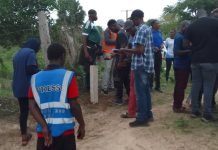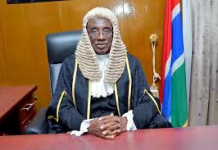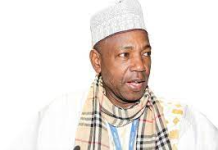By Saikou Suwareh Jabai
In this edition of Foroyaa Panorama, our reporter, Saikou Suwareh Jabai, met the Gambia’s oldest living journalist, Alhagie Baba Musa Trawally at his residence in Latrikunda Yiringanya. The 85 year old retired journalist was the publisher and editor of ‘The New Gambia Newspaper’. In this encounter, he talks about interesting issues, including his career as a journalist and the Gambian media during the British administration and the first republic.
Enjoy reading the interview at verbatim.
Jabai: What brought you into journalism?
Ba Trawally: I cannot give any specific reason or time as to why and how I entered in the area of journalism but what I can remember is that I was very interested in reading and writing even when I was in school. I happened to be in my grandfather’s house who was a subscriber to a newspaper. I used to read the newspapers that I sent to him.
Jabai: What was the newspaper he was subscribing to and who was running it?
Ba Trawally: The paper was called ‘Gambia Echo’ and it was then edited by Lenry Peters Senior. The paper belongs to few rich men in Banjul.
When I left school, I went into teaching and that was nearly after the Second World War. After having my training as a qualified teacher, I was posted to a village called Balangarr in Central River Region (CRR). During my stay there, I made very good use of my time. I spent all my time reading. At that time, communism was beginning to spread its tentacles in Africa. The British government wanted to contain that by sending newspapers to people. I was receiving very good newspapers at the village in Balangarr. They were sending newspapers to anybody who was in a position of importance in the country because they wanted to get the British culture in our heads. Reading these newspapers helped to raise my spirit and developed my understanding of world problems. One thing leads to another. I became more interested in the search for the truth. So I continued to read. I had a book which I found. My principal at the college, Samuel Burk (S.I. Burk), was going on leave so he called me and my fellow students to help clean his house because he was going. So we went and after work, the man presented us with books. On my way home, within the premises, I found a book lying on the floor and I picked it up and went away with it and put it in my book shelve in Balangarr. I did not read them until one Sunday morning. Then I was a bachelor. I was cleaning my sitting room. I went very close to the book shelve and put my hand on this book and lifted it. I opened the first page and read it. I found it very absorbing and interesting. I sat on the floor that Sunday morning and read this book up to midnight because it was so interesting. It captivated me and could not do any other thing.
Jabai: What was the title of the book and what is it about?
Ba Trawally: The book is called ‘The Case Of The Drawn Dock’ and it was published by Early Scanley, an American crime fiction writer. It is a crime novel.
Jabai: What really got you attracted to this book?
Ba Trawally: Well, the language. It was a modern language and as a young man I had the spirit of fighting. It was a legal argument between lawyers who were using strange words against each other. It was so captivating and I spent the whole night reading it up to day break. I went to work and closed by 2pm and went back home and continued reading the book. I used to lie on my bed and read and when I slept along, I used to roll on the book and the pages got scattered. I felt very sad about that and I decided that I must find a replacement for this book. Then I wrote to a bookshop in England, Charencross bookshop, to request for a replacement. In those days, you can write and put your letter in the ship which travels fortnightly. In few weeks’ time the book arrived and it costs 7 Shillings and 6 pence.
You see, these are some of the motivations in my drive to become a journalist. I argued every point and I don’t swallow nonsenses from people. Because these books and newspapers I read have already prepared and grounded me.
Jabai: Can you remember when you got into journalism?
Ba Trawally: Well, I will come to that, (laughs). In 1957, while I was in Balangarr when Ghana attained its independence, I wrote to Kwame Nkrumah congratulating him on the attainment of their independence. Fortunately, I was moved from Balangarr to Essau, very close to Banjul. I then had a platform of writing, I wrote so many articles and one of them was ‘A King Other Than Joseph Will Reign’. This is a biblical phrase from the bible. You know I was brought up in a Christian home, so I know the bible. What I was trying to say is that the people at the department of education at the time, most of them were highly incompetent people. They were bullying people and that brought the article. It was telling that your days will end and others will come too. I gave a different name. I wrote the name of a woman. I wrote ‘Miss Warner’ as the author of the article because I wanted to hide my identity. There are so many similar articles I wrote. The governor of The Gambia at the time was called Edward Windley. He came to my school unannounced and he was not accompanied by any education officer. He came with his own people and I was then the head teacher of that school. I was in the school with my teaching staff, so I saw a vehicle rounding the school premises. I then said to my assistant teacher, “Ring the bell and let all the students assemble”. When the students assembled, I told them that we have visitors but we do not know who they are. I told them that one of the vehicles has a union jack flag and I believed he must be a very important person. When they alighted from the vehicle, the senior man held my hand and pulled me out of the crowd. He asked me where I did my schooling. I told him here in The Gambia. He then asked if I went to Europe to further my education and I told him no. He said to me “You look different”. Later on in 1962, I resigned from teaching because the classroom was too small for me. The same year, I registered a newspaper called ‘The New Gambia’. During my days, I had help. In 1965, Sir Dawda Kairaba Jawara gave me a scholarship to go and study journalism in Israel. I was attached to the Jerusalem Post, a very popular newspaper. Then in 1966, I had a sponsorship from the United States to visit America because I was attached to a training course that was going on in Columbia University in New York. I did a lot of research during these times and I found out that in 1874, there was a newspaper in The Gambia published by liberated Africans and whites who have trading interests in The Gambia. They were doing this to protect their commercial interests. Then in 1898, there was a newspaper in The Gambia called ‘The Intelligensia’, published by the gentries of Bathurst. In 1901, there was a newspaper in Janjangbureh called ‘The Opinion’. I could not read a copy of ‘The Opinion’ but I had the opportunity to read a copy of ‘The Intelligensia’, where the editorial was querying the British government for trying to force Musa Molloh to surrender his territory (Fuladu) to the British government. Edward Francis Small also had a newspaper. In fact, he had two newspapers, one in Senegal and one in The Gambia. Then you have people like Findin Daley, Mustapha Colley, Horatio Joiner and Andy Jones. These are all prominent people who have been actively involved in newspaper work in The Gambia. Then you have those of my generation around 1962, where you have people like Dixon Colley with ‘Africa Nyato’, which was later changed to ‘The ‘Nation’. I also registered ‘The New Gambia’. Some years later, Mbakeh Njie published ‘The Progressive Newspaper’, and then others came like Baboucarr Gaye’s paper, Observer, Point, the PPP newspaper called ‘The Gambia Times’, the PDOIS newspaper called ‘Foroyaa Newspaper’ and others.
Jabai: You have given a comprehensive historical background of the media in The Gambia. What was the content of some of these major newspapers?
Ba Trawally: Some of these newspapers were used as a forum for the propagation of the politics of their authors. They were used to popularize their political beliefs. Some of these papers are the newspapers of Edward Francis Small, The Intelligensia, Findin Daley’s paper, Andy Jone’s paper, The New Gambia published by me, and others. They were all outspoken newspapers conveying the voices of the people; speaking and fighting for the people and at the same time respecting the king and the queen.
Jabai: How was the relationship between the newspapers and the administration by then?
Ba Trawally: There are sometimes conflicts between newspapers and the administration at the time. Some of these issues reached the courts. During the colonial times, the judiciary was manned by British legal luminaries. In those days, any article published against a local civil servant or an expatriate from England, the governor will make sure that you go to court and prove your case. The judges at the time were very impartial and they do not take sides because they are British or because the case involves a civil servant. Mr. Findin Daley had a serious case with a doctor attached to Bansang Hospital. The doctor was accused of abusing patients. The governor said the matter must go to court for the doctor, who is a British, to prove himself at the court. The judge was a British too but when the judgment came out, it was ruled in favor of Findin Daley. You can see the judges of those days were impartial. Andy jones too had a similar case with a dentist at the then Royal Victoria Hospital in Banjul for abusing a patient. He published it and they went to court. Another English judge also ruled in favor of Andy Jones and against his fellow British. The New Gambia Newspaper also had a case against one British woman called Mrs. Rodgey. Both the judge and attorney general at the time were all British and they ruled in favor of ‘The New Gambia’.
Jabai: What was the case about?
Ba Trawally: It was a civil case, not criminal. It was a libel case. So this was the situation. The New Gambia had a criminal case against its publisher and the magistrate that presided over that case was a Sri Lankan who wanted to secure his job by favoring the government and gave an adverse judgment against the editor of The New Gambia. A British government judge who presided over the appeal reduced the sentence from 27 months to 13 months. He threw all the 14 months away as not justified. Again The Gambia Court of Appeal presided over by judges from Sierra Leone, headed by Doug Edwin, and his deputy was Marcus Jones.
Jabai: Who was the editor of The New Gambia?
Ba Trawally: I was the publisher and editor of the newspaper.
Jabai: What happened after serving the 13 months jail term?
Ba Trawally: After that, my paper was banned and I was not allowed to publish it. So I picked up a job with the BBC and I was their stringer (freelance reporter) in The Gambia for about 5 years. I was also the stringer for West African Journal in England. I got all these jobs because of my quality and competence. During those times, I was also writing for some local newspapers and I was hitting very hard….. (laughed out loud.)
Jabai: How would you compare the media environment during those days and now?
Ba Trawally: Ah, it is all the same. There is no difference between the PPP government and this (APRC) government. All these governments were taking people to court for libel. So what is the difference?
Jabai: Can we say freedom of speech was more exercised in the PPP government than now?
Ba Trawally: Yes! Yes! That’s quite true. In those days, you don’t look over your shoulder when speaking your mind.
Jabai: How were you producing newspapers in those days?
Ba Trawally: In those days, we used cyclostyle. We don’t have tabloids like now. I remember we used to publish some very interesting articles.
Jabai: What was the size of those papers, A4 size?
Ba Trawally: Yes, exactly, we use A4 size papers.
Jabai: Usually how many pages?
Ba Trawally: Well, sometimes four pages and they cost 6 pence.
Jabai: You must be very rich in those days?
Ba Trawally: Oh yes, I was very rich those days. Although, 6 pence was small but I was very rich. My paper was going like a hot cake. Everybody wanted to read my paper. A paper sells itself. The editor does not sell it, it is the content.
Jabai: Do you have pictures in your papers?
Ba Trawally: No, we don’t have pictures but we do have cartoons on it.
Jabai: Who was your paper’s cartoonist?
Ba Trawally: It was one Kebba Singhateh. He was a very good cartoonist and his drawings used to make a very big impact.
Jabai: Can you still remember some of your reporters?
Ba Trawally: I was one of them, one Pierre Sock, Louis and some others.
Jabai: What was the number of your circulation?
Ba Trawally: It is about 500 copies and even more sometimes. We print two packets of A4 usually. In fact, I remember one day when it was published two times in one day. That was the first time in The Gambia an evening paper came out. I am a type of a publisher who doesn’t wait. I can go to press anytime when there is a development. My paper was always controversial because I revealed secrets. If my paper attacks you, you cannot survive it. I attacked a vice president and a minister in The Gambia and it led to their downfall.
Jabai: How many days do you publish in a week?
Ba Trawally: We published 3 times weekly; Mondays, Wednesdays and Fridays.
Jabai: Where was your office located?
Ba Trawally: It was in Banjul.
Jabai: What was the editorial policy of those papers?
Ba Trawally: The editorial policies were consistently anti-government.
Jabai: How will you rate journalism of your time?
Ba Trawally: It was excellent. We did our best under that circumstance and the reading public was also behind us. They buy our papers and some of them even make donations to the papers.
Jabai: I’m sure you are still a reader of newspapers. Are you satisfied with the structure and content of articles now?
Ba Trawally: Well, it is seasonal. Sometimes you read a paper you find very interesting stories but it is not well reported or the information is not well presented. Sometimes you find excellent stories in the papers.
Jabai: What special advice do you have for journalists doing the trade now?
Ba Trawally: Read! Read! Read anything, do not spare yourself. Read and acquire a lot of knowledge. This makes you a good journalist.
Jabai: Sir, I wish to thank you heartily for sharing your encyclopedic knowledge and experience with our readers…. (hand shake)
Ba Trawally: You are welcome.
Mr Ba Trawally at the GPU Awards ceremony this year




















